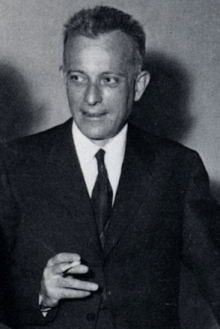Giulio Einaudi

Giulio Einaudi (Italian pronunciation: [ˈdʒuːljo eiˈnaudi]; 2 January 1912 – 5 April 1999) was an Italian book publisher. The eponymous company that he founded in 1933 became "a European wellspring of fine literature, intellectual thought and political theory"[1] and was once considered the most prestigious publishing house in Italy.[2] He was also the author of books on literature, history, philosophy, art and science.[1]
Biography
Giulio Einaudi was born in Dogliani (Province of Cuneo), the son of Luigi Einaudi, future 2nd president of the Italian Republic,[3] and his wife Ida.
He attended the Liceo Classico Massimo d'Azeglio,[4] and became a student of anti-fascist Augusto Monti.
On 15 November 1933 he founded the publishing house Giulio Einaudi Editore, located on the third floor of Via Arcivescovado 7 in Turin (the same building that had hosted Antonio Gramsci's L'Ordine Nuovo).
In 1994, Einaudi's company was taken over by Mondadori, a publishing conglomerate controlled by former Italian prime minister Silvio Berlusconi.[3] After working 64 years in the publishing business, Einaudi retired on 4 September 1997, aged 85, and died in Rome at the age of 87.
Family
His son Ludovico is a pianist and composer.
References
- ^ a b Wolfgang Saxon. "Giulio Einaudi, Italian Author And Publisher, Is Dead at 87", The New York Times (Archives), April 7, 1999.
- ^ Robert Lumley, "Einaudi", in Gino Moliterno (ed.), Encyclopedia of Contemporary Italian Culture, Routledge, 2002, p. 276.
- ^ a b Anne Hanley, "Obituary: Giulio Einaudi", The Independent, April 19, 1999.
- ^ Ward, David. "Primo Levi's Turin." In: Gordon, Robert S.C. (editor). The Cambridge Companion to Primo Levi (Cambridge Companions to Literature). Cambridge University Press, 30 July 2007. ISBN 1139827405, 9781139827409. CITED: p. 11.
